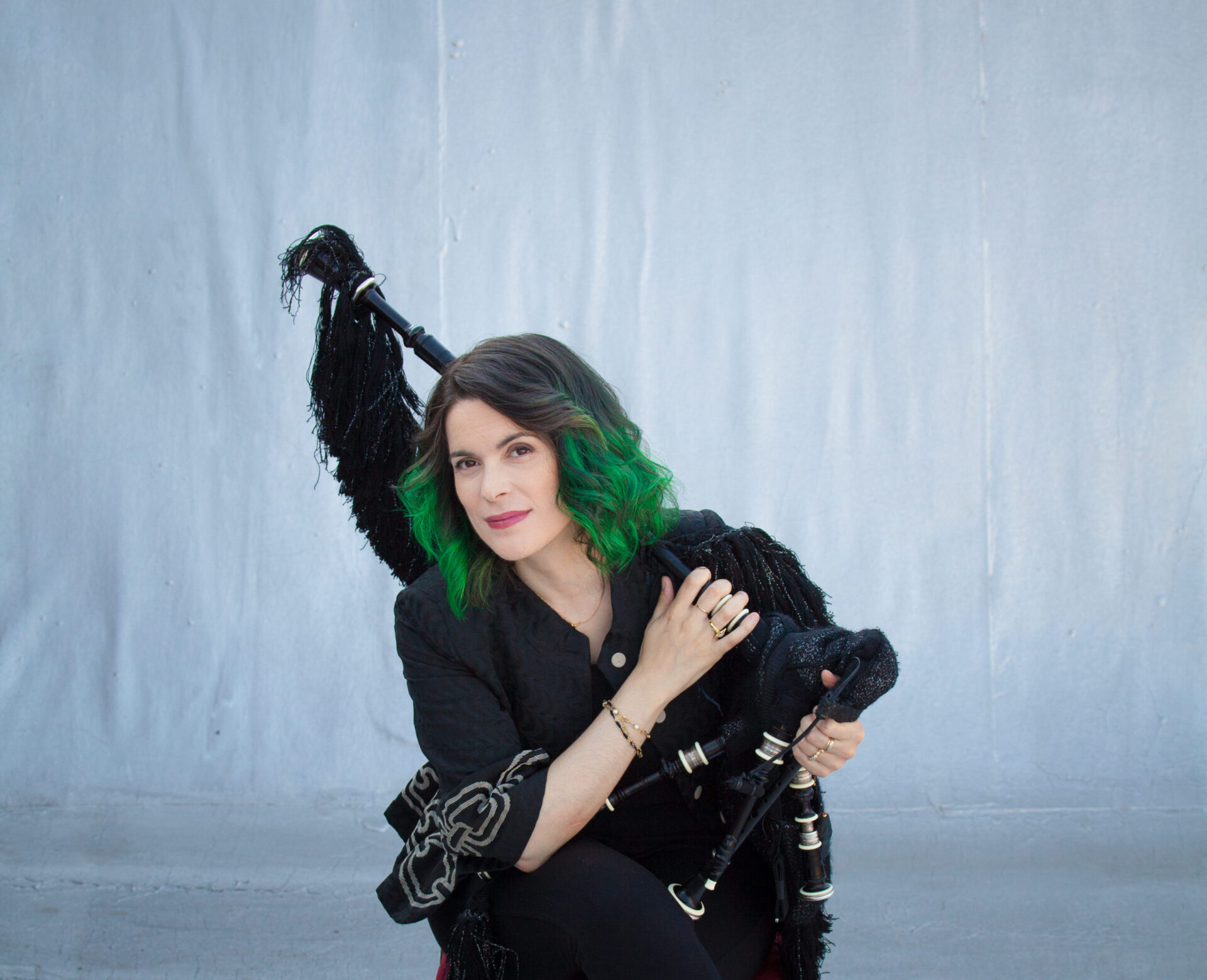For the new impactmania and UCSB program: Human Mind and Migration (HMM), we are featuring migrants who have been contributing cultural, social, and economic wealth and health to their adopted countries. The series Modern-Day Migrants in the Performing Arts explores how opportunities in art and performance can be a catalyst for migration, and how this migratory background has influenced artists’ creative output.
Add your migration story to the HMM program: www.hmm.ucsb.edu.
Cristina Pato is an active touring artist, composer, producer, writer, and educator — receiving particular international acclaim for her mastery of the Galician bagpipe and as a classical pianist.
A current resident of New York City, her unique instrument has taken her on tours throughout the world, including regular performances in Europe and the United States and sporadic tours in India, Jerusalem, Angola, China, Korea, Mexico, Turkey, and Spain, her home country.
She also serves as a Learning Advisor for Silkroad, founded by Yo-Yo Ma in 1998, an organization that creates music seeking to engage difference, spark radical cultural collaboration and passion-driven learning for a more hopeful and inclusive world. Additionally, she has designed lectures and held residences at a number of universities, including New York University, Harvard University, and the University of California, Santa Barbara (UCSB), where she develops interdisciplinary learning projects based on the power of arts in society.
impactmania speaks with Cristina Pato about her active dual professional careers, in both performance and education, devoted to propelling cultural exchange as well as the way her immigration roots have shaped her.
BY NATALIE GOMEZ
Throughout your active music and academic careers, in what ways have you noticed musical performance being used as an avenue for cultural exchange?
Being a performer and a professional touring musician — that’s to me the definition of continuous change and an avenue itself. I’m a collaborative artist, and I’m constantly working with artists from other communities.
I come from Galicia in the northwest corner of Spain and mine is a very particular tradition. I’ve always been interested in exploring different kinds of connections to different musical languages.
But once I moved to the U.S., 16 years ago, and started working with Silkroad, the organization founded by Yo-Yo Ma 20 years ago, then that cultural exchange itself became the center of my professional career, both as a musician and as a teacher. I started my own festival based on that, called Galician Connection, and then I began designing interdisciplinary projects for other institutions taking my passion for cultural exchange not only to the stage but also to the academic environments I got to work with as an artist in residence.
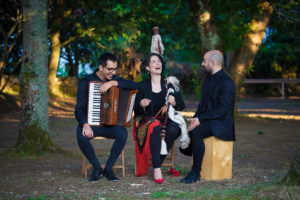
In addition to producing six of her own solo albums and appearing on more than 40 recordings as a guest artist, Cristina Pato is the leader of several musical ensembles, including the Cristina Pato Galician Trio which tours across Europe. (Photo by Xan Padrón)
How has working as a learning advisor for Silkroad and teaching students at different universities across the globe affected the way that you approach your own musical performances?
Well, it’s a combination of things. Because I began working for Silkroad as an artist and then after that, I became their learning advisor. But Silkroad is an organization that by default is focused on cultural exchange through music. The origin of the organization was about creating connections between different musical traditions using the Silk Road as a metaphor for cultural exchange.
So that being the base of this organization and the fact that I’ve been working with them for the last 15 years makes it very relevant in the way I understand my own career as a solo performer too. All my recordings as a solo performer are concept-based and the concepts that I’ve been using in the last two albums are deeply connected to my U.S. experience as an immigrant.
One is called Migrations. Which explores the connections between some of my colleagues from Silkroad with the jazz musicians that I got to work with in New York City.
The other album is called Latina, which explores the idea of using just one word to define all the people from a Spanish speaking country, and connects it to the idea of what would happen if we use just one rhythm to define us all. Exploring the ways on how a specific rhythm, like the 6/8, has found a home and adjusted almost everywhere in the world was my way to try to understand the complex meaning of the word “Latina.”
And as a teacher, Silkroad has literally changed my life. Not only because I consider Yo-Yo Ma one of my mentors in terms of understanding the role of the artist in society, but also because it has created some sort of a place in which all conversations about culture and exchange are welcome, musical conversations, academic conversations, learning conversations…
How has your Spanish heritage influenced your music and in what ways does traveling continue to inspire you?
I’m the daughter of immigrants. My parents, both Galicians, immigrated to Venezuela. They met there and had my oldest sister in Caracas and then they came back to Spain. My father was a musician too, an accordionist, and his way of playing had already been enriched by living in both places. Galicia is a land of emigrants, most of our population migrated during the 19th and 20th centuries, so for us this cultural migration is constantly present.
I migrated to the U.S., but mine was a choice, and I migrated in very different conditions than my parents did. I was looking for personal growth, cultural growth, I came to get my Ph.D. They were looking for survival when they migrated, and they were able to give us all the things they’ve never had access to.
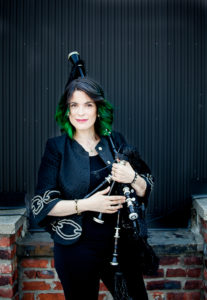
The Galician bagpipe master has devoted her career to facilitating cultural exchange and creating new paths for her unique instrument. (Photo by Xan Padrón)
I am influenced by my cultural identity as a Galician, but also by my experiences as a touring musician, as a teacher and as an immigrant-emigrant. All of it makes me who I am as a person. Feeling displaced, when at home in Galicia or when at home in New York City is a feeling I’m getting used to and that makes me understand how complex the word heritage is…
When you migrated from Spain to the U.S., what helped you initially get settled in your new environment?
I came as a student, I came to do my Ph.D. and then things started to go well, so I decided to stay. The whole concept of becoming an immigrant is a late feeling into the process. Since I wasn’t planning to stay in New York when I was 25 years old.
What made you end up staying?
It was a combination of factors. First of all, opportunities had started to arise. Second, I love New York, and the way you can interact with all the traditions here in New York. Everybody comes from somewhere else. You get to experience so many different musical languages in just one place, so much culture, and that’s something that always fascinated me.
Then my work with Silkroad and Yo-Yo Ma really started to make me wonder about what is the role of the artist in this society. In exploring that, I kept going and going and here I am, 16 years later.
When you did decide to stay, were there any difficulties that you faced as a migrant and how did you overcome them?
I think every person probably has a different way of understanding that. I’m not sure when I decided to stay. I’m not even sure how I did end up staying. Because when you come it’s like, well, let’s try another year. Let’s try another year and at the end of the game, you end up being a migratory human being to yourself too, because I’m not even sure where I belong to. If I belong to my Galician roots or to my New York ones, or to all the places and institutions that I get to work with long term.
Challenges, of course! Everybody that moves from one place to the other knows about those challenges. Sometimes those are bigger when you move from one country to the other, like the immigrations rules, the language or understanding the cultural differences and embracing them. But even when you move from Southern California to Santa Barbara, or from New Jersey to New York, you still have to adjust, and that adjustment is not the same for everybody.
Although I’ve been on the road all my life and I’m used to adjusting myself to any possible situation, when you decide to call a place home and decide to start contributing to that place then your whole set of values have to be readjusted and redefined.
Can you give an example of how you’ve impacted your communities?
Well, the thing about my job is mostly about where you are being asked to be. If I’m invited as a performer, my impact is probably ephemeral, since you come in, play and then move on to the next city.
But if I’m invited to bring in my whole self, the teacher and thinker, apart from the performer, then I try to be a good listener to be able to understand which one of my qualities or abilities or projects could be relevant or meaningful to that particular community.
My relationship, for example, with UCSB is one wonderful example of thinking about how I may be able to contribute with my skills to a community that I care about.
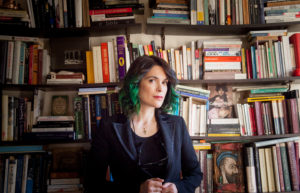
Though first and foremost a musician, Cristina Pato also enjoys an active career in academia as a newspaper writer and a university educator. (Photo by Xan Padrón)
At UCSB you’re exploring specifically how music and memory interconnect in your pilot class “Memory: An Interdisciplinary Exploration” inspired by your musical composition “My Lethe Story: The River of Forgetfulness” and the personal story of your mother’s dementia. Music has such an impact on our brains and well-being. Do you have any thoughts on what the effects of migration might do to our brains?
I have thoughts on the effect of migration to my own brain. But that’s just a personal reflection on the fact that once you move away from where you think you belong to, that constant adjustment makes you be more aware of whatever environment you come in.
Just being more aware is already a different way of understanding life. Learning a new language or a new set of cultural norms or a new way of interacting with people — all those are things that naturally, without even realizing, are impacting yourself as a human being.
There is a moment, like in the moment I am right now, that I always feel like I am in the middle. That I’m in-between. I try to carry the best of my culture and the best of the culture I decided to migrate to. Somehow you learn how to leave the bad things aside, take what is working and possible from both cultures, and try to create something unique to yourself out of that combination.
That, to me, is connected to awareness. As a musician who has been on tour for over 20 years now, I just think it is very different to be on the road and travel, than to become an immigrant. As an immigrant you bring your roots with you and those roots get rerooted in the place to decide to call home, and out of that old root, something new and old is born at the same time: something richer and more beautiful, because it carries the essence of your old home but gets nurtured by the soil and water of your new home…
When you decided to become a musician, did you ever consider that travel would become a part of your career?
I’ve been a musician all my life, so I don’t even think I decided to be one. Because that’s what I’ve been doing since I was a little girl. Even before I became a professional musician I was part of the Royal Bagpipe Band and we used to travel a lot.
Every Summer from when I was 6 to when I was 17, we would do tours all around Europe, Asia, and the Americas. So I’ve been used to traveling ever since I was a little girl [and] somehow it was very clear that being a musician meant traveling. Although that’s not the case for everybody, that was the case for me.
Then when my own solo touring schedule started, the very first years were mostly based in Spain, which is a small country but very diverse. So to get to experience different audiences from the South or the North of Spain was a learning lesson in the same way.
Ever since I moved to the U.S. and I started touring here — touring in big cities but also remote locations in the States, in rural locations or small cities that I didn’t even know where they were on the map — that’s a beautiful learning experience that makes you understand how generally diverse this country is too.
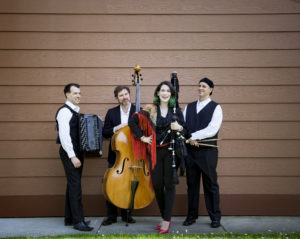
Blending the influences of Latin music, American jazz, and contemporary pop in their performances, Cristina Pato leads the Cristina Pato Quartet on tours across the U.S. (Photo by Xan Padrón)
What do you think it is about music that tends to unite people regardless of their cultural, socioeconomic, or political backgrounds?
I think it’s about emotional connection and community building. Somehow music is a language for the community. Although there are some traditions that are individual, music, for me, is community. And it could be understood in different ways, if you’re talking about folkloric music or classical music, both are different kinds of communities but are communities indeed.
For me, folkloric music is the music that comes from the community to and for the community, it’s alive, and it happens inside and within the community, and classical music is a different kind of transaction. People go to where the classical music is being performed and then a different kind of community could be created, it’s just a different one.
So I live in between, I live in between classical music and folkloric music, I live in between two cultural identities. I consider myself a migrant from folkloric to classical and classical to folkloric, and I do not belong to any of those, because I chose jazz as my language — the same way I’m an immigrant to the U.S. and I belong to both here and Galicia, but I am myself, an individual, by being in-between.
So that’s how I try to look at it. But at the end of the question, to me, is a question of emotions. Music really has the power to speak emotions that are difficult to describe with words…
impactmania’s past interviews and programs have been featured in international media, a number of universities, the UN, U.S. Consulates, and have been cited by Harvard Business School, Cambridge Scholars Publishing, and Duke University Press. impactmania’s Women of Impact program was awarded the U.S. Embassy Public Diplomacy grant (2019).
